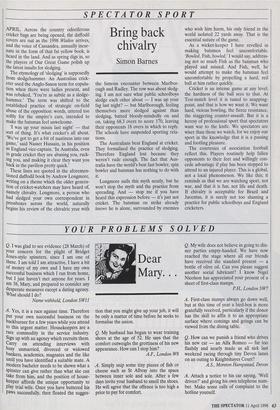SPECTATOR SPORT
Bring back chivalry
Simon Barnes APRIL. Across the country odoriferous cricket bags are being opened, the daffodil covers are out as the 1998 Wisden arrives, and the voice of Cassandra, annually incar- nate in the form of that fat yellow book, is heard in the land. And as spring digs in, so the players of Our Great Game polish up the latest insults for sledging.
The etymology of 'sledging' is supposedly from sledgehammer. An Australian crick- eter used the Anglo-Saxon term for copula- tion when there were ladies present, and was rebuked, 'You're as subtle as a sledge- hammer.' The term was shifted to the established practice of strategic on-field abuse of the opposition: words, uttered too softly for the umpire's ears, intended to make the batsman feel unwelcome.
`I was up your missis last night' — that sort of thing. It's what cricket's all about. `We've got to get a bit of nastiness into our game,' said Nasser Hussain, in his position as England vice-captain. 'In Australia, even in grade cricket they are abusing you, nick- mg you, and making it clear they want you back in the pavilion pretty quick.'
These lines are quoted in the aforemen- tioned daffodil book by Andrew Longmore, writing on a theme which the older genera- tion of cricket-watchers may have heard of, namely chivalry. Longmore, a person who had sledged your own correspondent in pressboxes across the world, naturally begins his review of the chivalric year with the famous encounter between Marlbor- ough and Radley. The row was about sledg- ing. I am not sure what public schoolboys sledge each other about — I was up your fag last night? — but Marlborough, feeling themselves more sledged against than sledging, batted bloody-mindedly on and on, taking 68.3 avers to score 170, leaving their opponents 18 overs in which to reply. The schools have suspended sporting rela- tions.
The Australians beat England at cricket. They formalised the practice of sledging. Therefore England lost because they weren't rude enough. The fact that Aus- tralia have the world's best fast bowler, spin bowler and batsman has nothing to do with it.
Longmore nails this myth neatly, but he won't stop the myth and the practice from spreading. And — stop me if you have heard this expression before — it's just not cricket. The batsman on strike already knows he is alone, surrounded by enemies who wish him harm, his only friend in the world isolated 22 yards away. That is the essential nature of the game.
As a wicket-keeper I have revelled in making batsmen feel uncomfortable. `Bowled, Fish, bowled,' I would say, address- ing not so much Fish as the batsman who played and missed. And Fish, well, he would attempt to make the batsman feel uncomfortable by propelling a hard, red ball at him rather quickly.
Cricket is an intense game at any level; the hardness of the ball sees to that. At Test-match level it is tuned to snapping- point, and that is how we want it. We want hard, vicious bowling, the fierce resistance, the staggering counter-assault. But it is a heresy of professional sport that spectators want war to the knife. We spectators are wiser than those we watch, for we enjoy our sport in the knowledge that it is a passing and footling pleasure.
The courtesies of association football reflect this. Players routinely help fallen opponents to their feet and willingly con- cede advantage if play has been stopped to attend to an injured player. This is a global, not a local phenomenon. We like this; it reminds us that we are watching sport, not war, and that it is fun, not life and death. If chivalry is acceptable for Brazil and Juventus, it is surely not too shaming a practice for public schoolboys and England cricketers.


































































 Previous page
Previous page